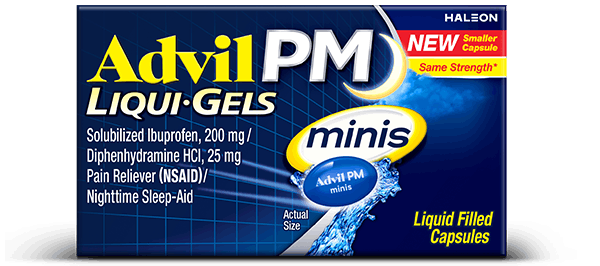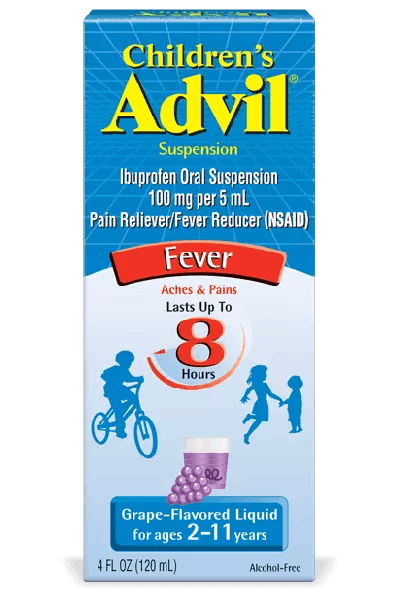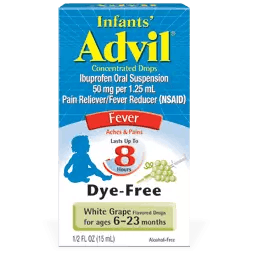What the Experts are saying
Leading health agencies have confirmed there is no evidence that ibuprofen will worsen COVID-19 symptoms. The CDC also recommends taking pain relievers like ibuprofen (eg. Advil) to relieve side effects after a COVID-19 vaccination, if you have no other medical reasons that prevent you from taking these medications normally.
-
The CDC recommends taking pain relievers like ibuprofen (eg. Advil) to relieve side effects after a COVID-19 vaccination, if you have no other medical reasons that prevent you from taking these medications normally.
Centers for Disease Control and Prevention, Updated February 17, 2021
-
The U.S. Food and Drug Administration (FDA) included ibuprofen on a list of essential medicines that are medically necessary to have available at all times for the management of acute conditions to have the greatest potential impact on public health. The goal of this work is to ensure the American public is protected against outbreaks of emerging infectious diseases, such as COVID-19, and other public health emergencies
-
“Based on currently available information, WHO does not recommend against the use of ibuprofen. We are also consulting with physicians treating COVID-19 patients and are not aware of reports of any negative effects of ibuprofen, beyond the usual known side effects that limit its use in certain populations.”
Perspectives from GSK Experts
-
What You Need to Know About the ANSM Decision - December 4, 2020
Following earlier statements from the French Minister of Health regarding the use of ibuprofen for COVID-related symptoms, today, the French health agency “Agence Nationale de Sécurité du Médicament et des Produits de Santé (ANSM)” announced that they will require COVID-19 warning messages on direct to consumer advertising for ibuprofen and aspirin products in France.
GSK believes there is no new scientific evidence or research to support this decision. As such, we maintain our position that COVID-19 patients can use ibuprofen/Advil to treat pain and reduce fever, when used as directed.
The current scientific literature does not show that OTC ibuprofen/Advil makes COVID-19 health outcomes worse, and the world’s leading health authorities have confirmed there is no evidence to recommend that COVID-19 patients avoid OTC ibuprofen, including the Centers for Disease Control and Prevention (CDC), World Health Organization (WHO), U.S. Food and Drug Administration (FDA), European Medicines Agency (EMA), and the Commission on Human Medicines (CHM).
The WHO’s most recent guidance states, “At present, based on currently available information, WHO does not recommend against the use of ibuprofen.” The WHO consults with physicians treating COVID-19 patients and is “not aware of reports of any negative side effects of ibuprofen, beyond the usual known side effects that limit its use in certain populations.” In addition, the WHO lists ibuprofen as an essential medicine for treating pain and fever associated with mild COVID-19 symptoms.
Ibuprofen is a well-established medicine that has been used safely and effectively for many years as a fever reducer and pain reliever, when used as directed, and is strictly regulated to ensure it complies with local healthcare authority requirements. Our ibuprofen products are used by millions of consumers across 40 markets and have been available as over-the-counter medicines for more than three decades. People should always speak with their doctor or pharmacist if they have any questions about treatment for their individual needs when seeking to treat or manage symptoms or conditions.
-
Adding Research Publications to What We Know About Ibuprofen and COVID-19 – September 23, 2020
Richard Petruschke, PharmD
Your safety, health, and trust in Advil (ibuprofen) is a huge responsibility that we take very seriously at GSK Consumer Healthcare.
We know you’ve had questions about taking ibuprofen to treat COVID-19 symptoms and may have wondered if ibuprofen can make COVID-19 or other respiratory illnesses worse. These questions may arise again as we head into this upcoming flu season and you reach for ibuprofen/Advil to treat flu-associated pain and fever when ill, just like you have in the past.
We’ve been constantly monitoring and evaluating research papers recently published in a broad range of scientific or academic journals around the world. Experts have weighed in, and these papers provide public health authorities and the medical community with an opportunity to review, assess and share knowledge about the safe use of ibuprofen. These experts are from the fields of infectious disease, pain management, respiratory disease, and public health, among other medical fields
The scientific consensus is clear. Over-the-counter (OTC) ibuprofen/Advil remains safe to use as directed. The current scientific literature does not show that OTC ibuprofen/Advil makes COVID-19 health outcomes worse, and the world’s leading health authorities have confirmed there is no evidence to recommend that COVID-19 patients avoid OTC ibuprofen. The safety profile of ibuprofen/Advil remains unchanged and information can be reviewed on our site.
We are committed to an ongoing assessment of ibuprofen/Advil. While we have shared information as it became available through this site and other channels, we also want to provide a quick summary here of the research papers that have come to our attention.
Based on the totality of available information, GSK Consumer Healthcare, alongside many public health authorities around the world, is confident in the safe and effective use of OTC Advil when used as directed. Please speak directly with your doctor, pharmacist, or healthcare provider if you have questions about your individual treatment needs.
From everyone at GSK, stay well and be safe.
Recent Research Publications (March to September 2020)
A study conducted in Denmark and published in PLOS Medicine in September 2020, concluded that there was no association between NSAID use up to 30 days before testing for COVID-19 and mortality within 30 days or adverse outcomes within 14 days, including hospitalization, ICU admission and ventilation, for COVID-19 patients, and that NSAIDs do not lead to more severe coronavirus disease [Adverse outcomes and mortality in users of non-steroidal anti-inflammatory drugs who tested positive for SARS-CoV-2: A Danish nationwide cohort study, Lund LC, Kristensen KB, Reilev M, et al. Adverse outcomes and mortality in users of non-steroidal anti-inflammatory drugs who tested positive for SARS-CoV-2: A Danish nationwide cohort study. PLoS Med. 2020;17(9):e1003308. Published 2020 Sep 8. doi:10.1371/journal.pmed.1003308]
An article published in August 2020 by the London School of Hygiene and Tropical Medicine found no evidence of a harmful effect of NSAIDs on COVID-19 related deaths. Risks from COVID-19 do not need to influence decisions about therapeutic use of NSAIDs. [OpenSAFELY: Do adults prescribed Non-steroidal anti-inflammatory drugs have an increased risk of death from COVID-19?, Wong AYS, MacKenna B, Morton C, Schultze A, et al. OpenSAFELY: Do adults prescribed Non-steroidal anti-inflammatory drugs have an increased risk of death from COVID-19?. medRxiv; [Preprint]. August 14, 2020. doi:10.1101/2020.08.12.20171405]
Researchers found no supporting evidence to discourage the use of ibuprofen in a July/August 2020 article published in the American Journal of Therapeutics, although authors raised a concern regarding the safety of ibuprofen use because of its potential role in increasing ACE-2 receptor levels within the Renin–Angiotensin–Aldosterone system. However, available data from limited studies show administration of recombinant ACE2 improves lung damage caused by respiratory viruses, suggesting ibuprofen use may be beneficial in COVID-19 disease. [COVID-19 and Avoiding Ibuprofen. How Good Is the Evidence?, Kutti Sridharan G, Kotagiri R, Chandiramani VH, et al. COVID-19 and Avoiding Ibuprofen. How Good Is the Evidence?. Am J Ther. 2020;27(4):e400-e402. doi:10.1097/MJT.0000000000001196]
While a study published in Archives of Clinical Infectious Diseases in July 2020 found a “significant relationship” between the history of ibuprofen consumption and the symptom severity of COVID-19 and the mortality rate of COVID-19 patients in Iran, it is important to note the researchers did not study OTC ibuprofen and that the conclusion was primarily based on hospitalized patients with severe COVID-19 and underlying diseases such as hypertension, kidney disease and heart disease, who had been admitted to the ICU or died. The authors reported that the study was limited by its low sample size, and inaccuracy of the daily dose of NSAIDS. [The Association of Non-Steroidal Anti-Inflammatory Drugs with COVID-19 Severity and Mortality, Samimagham HR, Arabi M, Hooshyar D, KazemiJahromi M. The Association of Non-Steroidal Anti-Inflammatory Drugs with COVID-19 Severity and Mortality. Archives of Clinical Infectious Diseases. (In Press). Published 2020 Jul 13. doi: 10.5812/archcid.106847]
A recent study, published in Headache in July 2020, concluded that there is no specific evidence at this time against the use of NSAIDs in patients with or without COVID‐19. Authors recommend a patient should be assessed for any other chronic diseases, underlying or pre-existing illnesses or conditions (i.e., co-morbid medical conditions) that may limit the use of NSAIDs and recommend a discussion of risks and benefits with all patients prior to prescribing NSAIDs. [COVID‐19 and Headache Medicine: A Narrative Review of Non‐Steroidal Anti‐Inflammatory Drug (NSAID) and Corticosteroid Use, Arca KN, Smith JH, Chiang CC, et al. COVID-19 and Headache Medicine: A Narrative Review of Non-Steroidal Anti-Inflammatory Drug (NSAID) and Corticosteroid Use [published online ahead of print, 2020 Jul 10]. Headache. 2020;10.1111/head.13903. doi:10.1111/head.13903]
Authors of a study published in Nature (British Dental Journal) in July 2020 concluded that ibuprofen can be used appropriately for dental procedures, and that there is no guidance in the literature suggesting that changes should be made to analgesia regimes for dental patients with or without COVID symptoms nor to support avoiding ibuprofen in this group. [Safe Use of Paracetamol and High-Dose NSAID Analgesia in Dentistry During the COVID-19 Pandemic,Crighton AJ, McCann CT, Todd EJ, Brown AJ. Safe use of paracetamol and high-dose NSAID analgesia in dentistry during the COVID-19 pandemic. Br Dent J. 2020;229(1):15-18. doi:10.1038/s41415-020-1784-3]
An article published in British Pharmacological Society in July 2020 noted that epidemiological studies have suggested potential benefits for NSAID use on reducing the risk of development of severe disease in COVID-19 patients while also raising warning for ibuprofen use in COVID-19 patients. [Non‐Steroidal Anti‐Inflammatory Drugs, Prostaglandins and COVID‐19, Robb CT, Goepp M, Rossi AG, Yao C. Non-steroidal anti-inflammatory drugs, prostaglandins, and COVID-19 [published online ahead of print, 2020 Jul 23]. Br J Pharmacol. 2020;10.1111/bph.15206. doi:10.1111/bph.15206]
Researchers who published a paper focused on pneumonia in JAMA Network Open in July 2020 found that the currently available data, including the primary endpoints in their study, do not seem to support strong recommendations against using NSAIDs in patients with viral pneumonia. [Association of Nonsteroidal Anti-inflammatory Drug Use and Adverse Outcomes Among Patients Hospitalized with Influenza, Lund LC, Reilev M, Hallas J, et al. Association of Nonsteroidal Anti-inflammatory Drug Use and Adverse Outcomes Among Patients Hospitalized With Influenza. JAMA Netw Open. 2020;3(7):e2013880. Published 2020 Jul 1. doi:10.1001/jamanetworkopen.2020.13880]
Authors of an observational study from South Korea, published by Clinical Infectious Disease in July 2020, suggested that the harms associated with NSAID use may outweigh their benefits for patients with COVID-19, and therefore should be used with caution. Researchers looked only at patients hospitalized with COVID-19 who were prescribed prescription-strength, not OTC NSAIDs in the 7 days before and including their inpatient hospitalization, and it is unclear if the prescribed NSAIDs were part of their COVID-19 treatment courses or for one or more underlying serious health conditions. [Association between NSAIDs use and adverse clinical outcomes among adults hospitalized with COVID-19 in South Korea: A nationwide study, Jeong HE, Lee H, Shin HJ, Choe YJ, Filion KB, Shin JY. Association between NSAIDs use and adverse clinical outcomes among adults hospitalized with COVID-19 in South Korea: A nationwide study [published online ahead of print, 2020 Jul 27]. Clin Infect Dis. 2020;ciaa1056. doi:10.1093/cid/ciaa1056]
An article in Clinical Microbiology and Infection from June 2020 concluded that in the studied cohort of COVID-19 patients, ibuprofen use was not associated with worse clinical outcomes, compared with paracetamol (acetaminophen) or no treatment. [Ibuprofen Use and Clinical Outcomes in COVID-19 Patients, Rinott E, Kozer E, Shapira Y, Bar-Haim A, Youngster I. Ibuprofen use and clinical outcomes in COVID-19 patients [published online ahead of print, 2020 Jun 12]. Clin Microbiol Infect. 2020;26(9):1259.e5-1259.e7. doi:10.1016/j.cmi.2020.06.003]
An early study in Vancouver, BC, Canada, concluded that the current epidemiologic evidence is not strong enough to infer a causal link of a harmful effect of ibuprofen in patients with COVID-19, and we need to be cautious when drawing conclusions from evidence that is derived from mechanistic or theoretical pharmacology, as they are not always corroborated with data from clinical trials. In this study from Chest in March 2020, the authors did advise that patients use acetaminophen monotherapy for fever reduction in a patient with COVID-19 and add ibuprofen if acetaminophen alone cannot reduce the fever. [Safety of Ibuprofen in Patients With COVID-19: Causal or Confounded?, Sodhi M, Etminan M. Safety of Ibuprofen in Patients With COVID-19: Causal or Confounded?. Chest. 2020;158(1):55-56. doi:10.1016/j.chest.2020.03.040]
-
What We Know Today About Ibuprofen and COVID-19 – April 17, 2020
Peter S. Van Zile, Pharm.D
We know it’s a very challenging time for everyone, regardless of where you live. It is disquieting – and scary – to watch the COVID-19 pandemic escalate across the globe. And, as we watch more and more communities become significantly affected, we have many more questions about what we should and should not be doing. It is an unprecedented time, and people are urgently searching for accurate information they can rely on to safeguard their families and friends.
We want to help. Your safety, health and confidence in our products are at the forefront of everything we do at GSK Consumer Healthcare, the maker of Advil products. We know there have been questions and concerns about the use of Advil (ibuprofen) for COVID-19, and we have been working hard to make sure everyone who relies on ibuprofen to reduce their fever and relieve pain are getting the information they need.
As a medical professional, I have thoroughly reviewed and discussed with my peers the opinions of international health authorities, including the CDC, WHO, the NIH, and the FDA. With this in mind, I’d like to take a moment to put your questions about the use of Advil into perspective based on what we know about COVID-19 today and the historical facts we have at hand.
• Ibuprofen is safe and effective when use according to the labeled directions. Because the COVID-19 pandemic is still unfolding, we don’t have scientific data relating to the use of ibuprofen for COVID-19. However, Advil is one of the most well established, well studied, and well understood pain relievers in the world, with over three decades of data from safety studies to support use of ibuprofen to reduce fever and relieve minor aches and pain associated with the common cold or viral infections such as the flu
• The Centers for Disease Control, World Health Organization, and Food and Drug Administration have shared a perspective. Based on currently available information, the majority of credentialed international health authorities continue to support its use to treat the symptoms of COVID-19.
• The public conversation was based on a scientific hypothesis that was intended for consideration among health professionals. The hypothesis was not meant to be a recommendation for the public to use or not use certain medicines, but instead to further investigation among the scientific community.
If you are exhibiting symptoms of COVID-19, contact your doctor immediately. Any decisions you make should always be made in partnership with a doctor who knows your health history and can examine your symptoms. If you are currently taking ibuprofen for a condition on the advice of a doctor, do not stop taking your medication unless you first talk to them.
From everyone at GSK, stay well and be safe.







